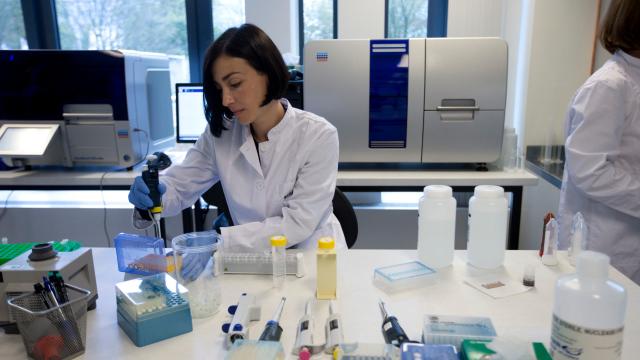Like Australia, Canada is among the few countries in the world where genetically engineering human embryos isn’t just illegal, doing so could land you behind bars.
Image: AP Images
In the United States, using genetic engineering techniques such as CRISPR to make genetic alterations that can be passed on to future generations is illegal, but scientists are still allowed to conduct experiments that include genetically altering embryos, so long as those embryos never have the chance to become babies.
In Australia, though, those who use gene editing techniques on human embryos risk 15 years gaol. And in Canada, even basic research that might be categorised as “germline editing” risks a hefty fine or up to 10 years in prison. Now Canadian scientists and ethicists have joined forces to speak out against the prohibition and its damaging impact on Canadian science.
“Scientists here feel left behind,” Vardit Ravitsky, a University of Montreal bioethicist, told Gizmodo. “They have the technical capacity to do this research and they have these good research questions. The only reason they’re not doing it is legal.”
Canadian scientists have found themselves left out of the conversation as even countries such as the US, with its relatively strict prohibitions on human germline editing, are breaking new ground with CRISPR at a rapid clip. In China, over the past two years, scientists have already edited the DNA of embryos several times over. In the US, in August scientists genetically modified a human embryo for the first time, removing a disease-causing genetic mutation, prompting calls for the country to lift a ban on federal funding for research that involves germline editing. In the UK, scientists have been given the green light to edit genes in embryos for research, too.
Standing in the way of Canadian scientists is a section of Canada’s Assisted Human Reproduction Act, a set of laws forged in the aftermath of advancements in stem cell research, the Human Genome Project and Dolly the Sheep, as the public worried about scenarios such as human cloning. The law makes it a criminal act to alter the genome of a cell or embryo in such a way that the change might be transmitted to descendants.
“The main logic here is a slippery slope logic. If you allow us to genetically alter an embryo for research, what’s next?” said Ravitsky. “But embryos don’t fall by chance into a uterus. By banning research you are banning research that is not just about making babies. This research can promote our understanding of reproductive development, of the development of diseases. It makes no sense to say no to research.”
Ravitsky said that Canada would do better to have a law closer to the one in the US, which allows research but not the implantation of altered embryos in a uterus.
“In a few years, if we decide it’s safe and we want to move ahead with the first gene-edited pregnancy, we can decide then,” she said. “We don’t have to decide now.”
Earlier this month, Bartha Knoppers, a health-policy expert at McGill University, presented a consensus statement from Ravitsky and others at an annual meeting of stem cell and regenerative-medicine researchers arguing that “basic and pre-clinical research on human germ cells and embryos in the earliest stages of development should be allowed”. The group is also arguing for Canada to legalise so-called “three-parent babies“, a procedure legal in the UK in which the risk of mitochondrial disease is eliminated from an embryo by giving it a tiny bit of donor DNA. The group recently formed a formal group to advocate for the policy changes, the Coalition for Research on Informed Science Policy, or CRISP.
“Right now, we’re literally importing sperm from the US because it can’t be bought or sold here. Surrogacy is illegal,” Kerry Bowman, a bioethicist at the University of Toronto not involved with CRISP, told Gizmodo. “There is reason to be cautious, but hanging on to an outdated law like this and letting our scientists fall further behind is good for no one.”
Allowing germline editing, even just for research, would likely require an act of Parliament to change Canadian federal law. A statement from Canada’s health ministry, though, might allow a reinterpretation of the existing law that could pave the way for Canadian scientists to do some CRISPR research in embryos.
“People think we want the Wild West, but if you look at the UK they actually have more robust oversight even though they are allowing this research to happen. Safety concerns don’t justify a criminal ban, they justify appropriate oversight,” said Timothy Caufield, a health policy expert at the University of Alberta. “This research is in early days, we should be careful not to hype the potential benefits. But we also need to be careful not to hype the harm. Designer babies are not just around the corner.”
